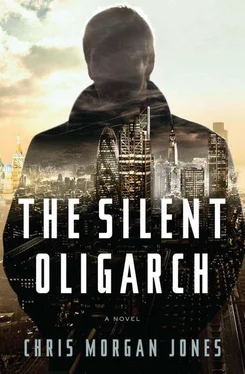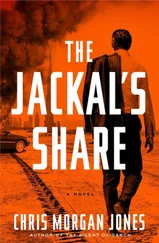Lock looked over Friis’s shoulder for the waitress.
“I don’t know. We’ll find out. A little more than the others probably. That’s usually how it works.”
“Is Malin worried?”
That was good, thought Lock—Malin worried. In his experience, when things went wrong Malin could rage silently but he doubted that he ever worried.
“It’s got nothing to do with him,” he said. “It’s a Faringdon matter.”
Friis smiled. Lock raised his hand to attract their waitress and as he did so one of his phones rang. The dedicated phone.
“Excuse me, Mikkel, I have to take this,” he said, sliding out from his bench seat and silently asking the waitress to bring him the same again. What was Malin going to say about the article? He had to have expected one sooner or later, and this hadn’t been too bad. He walked between tables toward the door.
“Konstantin, hello. How are you?”
“I am fine, Richard.”
“Did you see the piece?”
“I am not calling about the article. I have news that I thought you should hear. Dmitry Gerstman is dead.”
Lock didn’t react. A hundred thoughts struggled to form. He was outside now.
“He died in Budapest. He fell from a roof,” Malin said. “I know no more. Perhaps you could try to find out.”
“When?” said Lock, looking across the river at the Cathedral of Christ the Savior, an unearthly block of white in the stark sunlight.
“Yesterday. It is sad news. Please send flowers to his wife. Not from me, from you.”
“I will. Of course.”
“I will see you later, Richard.”
“Yes, I’ll see you tomorrow.”
Lock crossed the road, not quite heedless of the cars, and stood by the railings above the river. The wind was stronger than it had been in the morning. He had liked Gerstman; he had felt kinship with him. They had occupied the same world, and when Gerstman had left he had given hope to Lock that one day, if he could find his courage, he might do the same. It was childish, he thought, the stuff of boys’ adventure books, but he felt like a prisoner of war who learns that his fellow officer has been shot while trying to escape. And he knew, without having to learn more, that that was why Gerstman had died.
WEBSTER WAS PLEASED to see the name of Savas Onder appear in the file; it was like finding an old friend at a rather stiff party. Onder, he hoped, might actually speak to him.
He was beginning to feel unpopular. Since Dmitry Gerstman had shown such aversion to him in Berlin, he had been calling and visiting anyone he could find who knew Malin or Lock. He had spoken to friends in the oil industry who had known little, and to friends of Lock who had said less. In Baku he had tracked down a Scot who had set up a business with Lock in 1993; he had talked more than most Scots but told him only that Lock was no businessman: “There’s a man who buggers the notion that lawyers know how to make money.” He had found two people who remembered Lock from university—one, in fact, still saw him on his trips to London—but neither thought it seemly to talk and Webster couldn’t fault their loyalty. And he had called eleven directors and company agents associated with the ever more complicated corporate knot that Lock had tied; none had said anything of substance, but it would have been strange if they had. Nervous though he was of wives (former or not), he was even preparing to see Mrs. Lock, who seemed to have left her husband and moved to London.
So to see Onder’s name felt like luck. One of Webster’s better researchers had been working her way through a list of companies that had traded with Faringdon or Langland, and after some determined work had found that the mysterious-sounding Katon Services LS was a part of Onder’s oil-trading empire. Webster wasn’t surprised to see him there: it was on a Russian matter that Onder had first engaged him years before and it would have been strange if he and Malin had never crossed paths.
It was Friday, the first day that felt like autumn, and they were to meet that morning at Onder’s London office; to Webster’s regret Onder was not in Istanbul, one of the few places that he was always happy to travel to. He and Elsa had spent half of an unorthodox honeymoon there one December (the other on the coast by North Berwick, so cold that thick frost lay on the dune grass) and he hoped one day to take her there again.
Instead of the Pera Palace Hotel, then, Webster was in his kitchen that morning doing his best to leave the house. He had woken early and cycled to the Heath for a swim in the mixed pond, where the water was turning from cool to cold. When he got back he made porridge for himself and the children, took Elsa tea, showered, shaved, and dressed in the same suit as the day before, deciding that Onder probably didn’t expect a tie, even though he might merit one. Webster’s taste was for the serious and unadorned: dark suits, single-breasted, either navy or charcoal gray, with white shirts and dark ties, never patterned. Everything was well made and well worn. Elsa told him that he looked forever on the verge of delivering bad news, a death or a sacking, and he told her that nobody wanted their investigator to dress like a fop.
On his walk to the Tube across a newly frosty Queen’s Park he thought about Lock. He found himself thinking about him more and more. He should be feeling uncomfortable by now. He would have seen the article—articles, as a few other papers had taken up the story. Webster was pleased with Hewson’s piece in The Times, but surprised that it hadn’t gone further; he would have expected a second article to follow swiftly on the first. He should give Gavin another call. Perhaps it didn’t matter: he had also spoken to the FT, to The Journal, to Forbes, and felt sure that there was more to come. He wanted Lock to feel that a process had started that no one could stop.
What would have him really unsettled, though, were the calls from his friends. No one liked to learn that someone was asking questions about them. Even if you had nothing to hide it made you wonder whether in fact you did; and if, like Lock, you had made a career of hiding things it tended to make you decidedly nervous. For Webster, though, this was a strange way of operating: he spent so much of his life asking questions in the dark that to be out in the light made him feel a little uncomfortable himself.
So Gerstman would probably have mentioned it to Lock, unless he was keen to stay out of Russia altogether, and all those offshore directors would certainly have reported to their client. Webster wondered how much of this Lock would share with Malin. From the outside there was no way of telling how close they were, and accounts differed. The Scot had described the two as “friendly, but not intimate,” while those who knew Russia’s oil industry simply saw Lock, as Tourna did, as a stooge.
Webster thought about the type, these men—always men—who sold their identity to protect that of another. In every big project they appeared, the first line of defense, often shabbily prepared for battle. They were professionals, lawyers and accountants to a man, and of the second rank, their early careers suggesting that they had never been bound for the top. Some started young, others in middle age. In Webster’s world there were legions of them, of every nationality, operating out of unreal little offices in London, Dubai, Geneva, New York, setting up companies, dissolving them, tinkering endlessly with money. What did they get out of it, this unnatural, unbreakable arrangement? In Webster’s experience there were three motives, usually entwined. There was money—and easy money it was. Judging from his properties and his lifestyle, Lock must be worth ten million, perhaps twenty, and for this what did he do, really? Administer companies. There was security of income, since this was always a job for life: your client couldn’t walk away and neither could you. And there was power. Or rather, proximity to power. They had in common the mistaken belief that in serving a big man some of his stature would rub off.
Читать дальше












